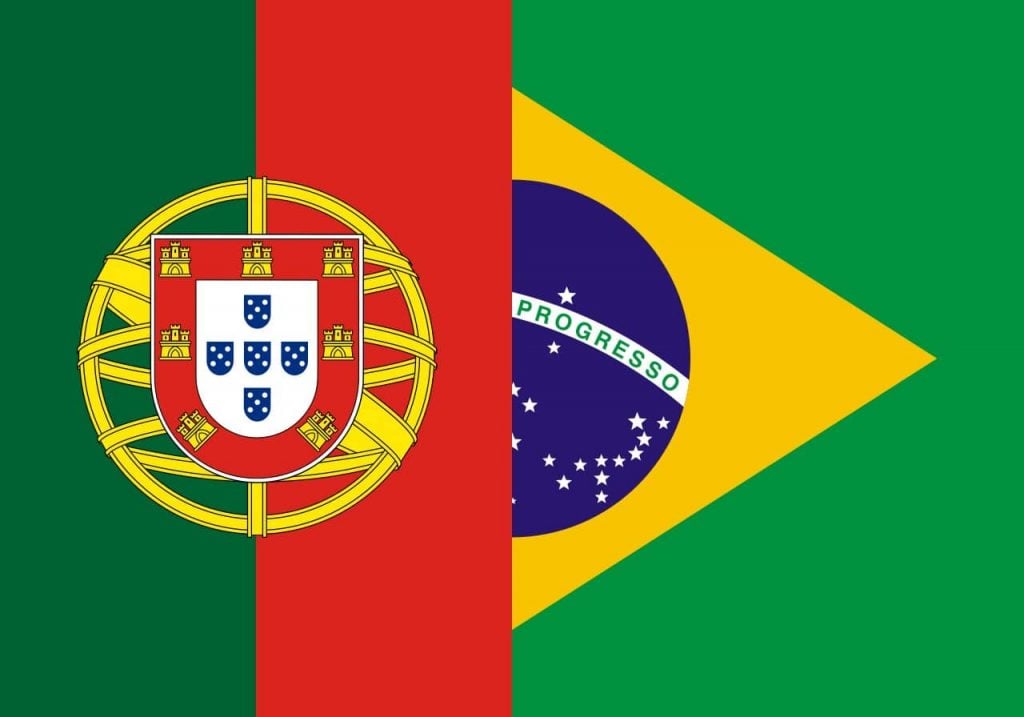Brazilian vs. European Portuguese: Which One Should I Learn?
The Portuguese language originated, as its name indicates, in Portugal. However, after several years of colonialism, it spread to almost every corner of the world, from Macau to Brazil. With the passing of time, the language started to develop differently in each place in nearly every aspect, like phonology, spelling, and vocabulary.
Although there are many Portuguese dialects, the most popular ones are the Brazilian and the European. So, which one should you learn? While all the varieties are intelligible among each other, you should pick the one that better suits your needs and requirements. Keep on reading and find out the three main aspects you should consider when picking the best Portuguese variety to learn.

Table of Contents
Image via Wikimedia
Pronunciation
The Brazilian pronunciation is usually easier to understand for beginners than the Portuguese accent. The South American variety is known for its relaxed pronunciation and open vowels, while the Portuguese pronunciation is rather tight and fast.
This is mostly because of the cadence of each accent:
Brazilian Portuguese is syllable-timed. This means that speakers will take almost the same time to pronounce each syllable, so it sounds slower than European Portuguese.
European Portuguese is stress-timed, meaning that speakers stress only the essential words in the sentence, scrunching together all the rest. This, in turn, makes it sound quite fast.
Still, there are 16 dialects within Brazilian Portuguese, while its European counterpart has only 4. So if you plan to go to Brazil, you should at least be aware of the main differences among all the different accents to be able to understand people regardless of where they were raised.
Spelling
Brazilians are known for being more progressive in how they spell words. As the way they pronounce words changes over time, they adapt the spelling of those words to reflect this development. European Portuguese, on the other hand, is more conservative.
If you take the word “fact,” for example, you’ll see that it is written “facto” in Portugal, which closely resembles the Latin “factum,” while in Brazil, the “c” is dropped since it is not pronounced there.
Although the presidents of Brazil and Portugal signed an agreement in 1990 trying to bring both varieties closer together and modernize the way the language is written, many Portuguese people are reluctant to change the way they have spelled words all their lives.
This means that, if you are just starting out with your Portuguese course, you may find it easier to learn a variety in which the spelling of a word corresponds to its pronunciation, as it happens in Brazil.
Vocabulary
Brazil is a melting pot of cultures, and this has inevitably affected the way Brazilians speak. Many words in this variety come from the several indigenous languages spoken in the region. Most of the vocabulary in European Portuguese, on the other hand, comes from Latin. This means that, if you are a Spanish, French, or Italian speaker, you will have a head start if you decide to take up European Portuguese!
Let’s take the word “pineapple” as an example. While in Brazil it is called “abacaxí,” which comes from the Tupí language, in Portugal it is called “ananás,” just like in many varieties of Spanish and Italian.
So, which Portuguese variety should I start learning? For most people, it will be easier to go for the Brazilian variety, since its pronunciation and spelling make it friendly for beginners (just beware of these common mistakes!). Still, many speakers of other Romance languages may find it easier to learn vocabulary if they study European Portuguese.
In spite of this, there are more aspects to consider besides the linguistic ones. For example, the European variety is the standard for all the other Portuguese-speaking countries. So, if you are going to travel to Portugal, Angola, or Macau (among other countries), it would not make much sense to learn the Brazilian variety. But if you plan to visit Brazil or do business with this South American giant, learning Brazilian Portuguese is the way to go!
If you have already started learning Portuguese and want to see how much you have learned, take our FREE Portuguese level test. To improve your test results, check out our online and in-person Portuguese classes with native speakers of either variety!



